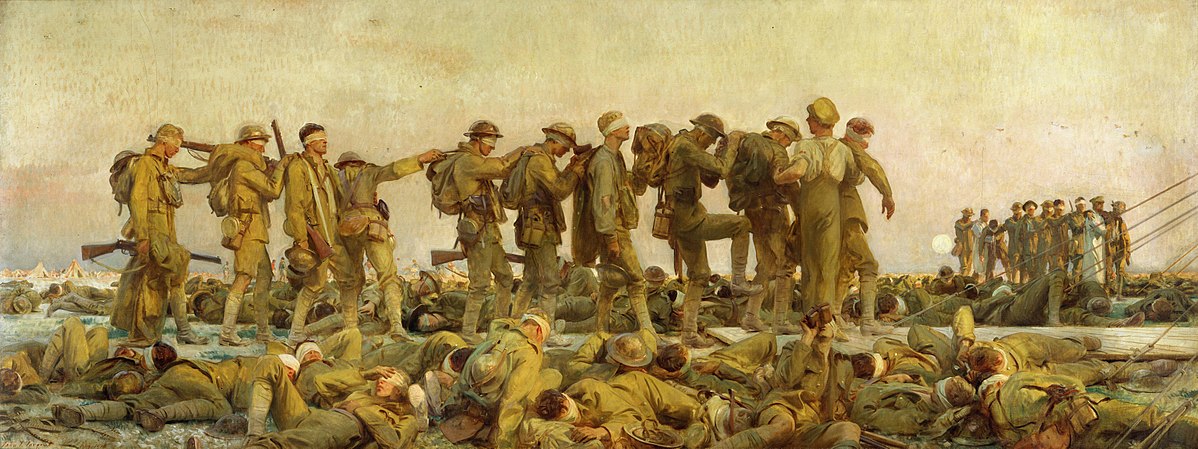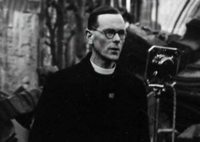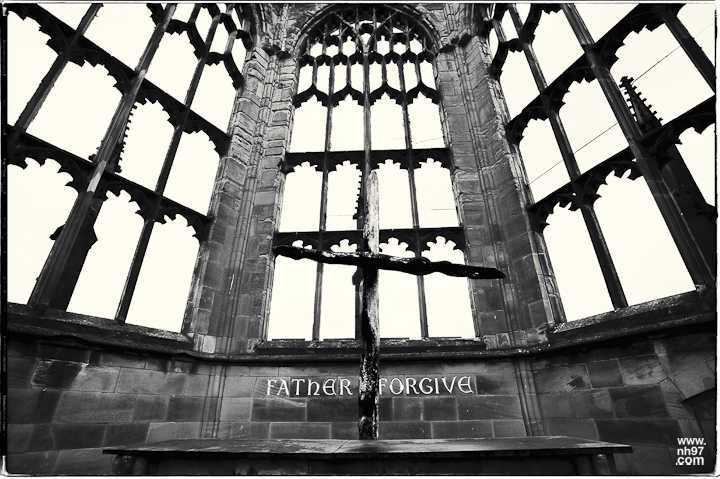‘Are we forever doomed to be warriors, wired from birth to be belligerent? Or is there, deep inside our species, an equal propensity toward peace?’

The scene is the aftermath of a mustard gas attack on the Western Front in August 1918 as witnessed by the artist (John Singer Sargent)-Photo and Source
A century ago this week, the world’s first major industrialized war ended with an armistice. Across the globe, whole societies were forever changed by the war and the peace process that followed.
This week, is also the 78th Anniversary of the Coventry Blitz, my home city since 1974.
In recognition of these momentous anniversaries, and to encourage a further and more meaningful dialogue and understanding of the lasting imprint of these events on the present, I am recalling a sample of stories and articles that I have written over the past few years or so on war and peace, hatred and love, despair and hope.
But, first and foremost, I want to begin to pay homage to The man who changed the course of my life, when I first visited Coventry Cathedral in 1973 and saw these two words: ‘FATHER FORGIVE’:
The very Reverend Richard Thomas HOWARD (12 June 1884– 1 November 1981), Provost, Coventry Cathedral, 1933 to 1958
Reimagining a Better World: A World of Hope, Healing and Peace

Provost Richard Howard: The Man who Gave us the Gift of Forgiveness and Reconciliation
Provost Howard, whose vision and portrait of a humanity that need not be condemned to endless cycles of aggression was anticipated and foretold by a young British officer called Wilfred Owen, who died a mere week before the Armistice on November 11th 1918, one more senseless death among so many others senselessly wasted.
To quote Ariel Dorfman,* Owen was only 24 years old when he was killed, though he wrote some extraordinary poems about his wartime experience. In one of them, "Strange Meeting," he eerily anticipated the impending end of his own life, speaking of "the waste of war in its time." They are verses that today -- when humanity is assailed with similar stories of carnage, poisonous gas attacks and fears of apocalypse -- are just as painfully relevant as they were back then.
In that poem, Owen channels the voice of a soldier who strikes up an unnerving conversation with a dead man. Together, they mourn "the undone years, the hopelessness," until the dead man reveals he was killed the previous day by the very soldier narrating this encounter: "I am the enemy you killed, my friend... Let us sleep now."
Owen was to sleep forever, without seeing the conclusion of the "War to End All Wars," according to a phrase from H.G. Wells. As the interminable conflicts and victims of the next hundred years attest, nothing could have been further from the truth: we continue to slaughter each other as if the curse of Cain is ingrained in our DNA, as if we had learned nothing. Our political leaders attend war time ceremonies and keep promising to "protect the peace" while doing not nearly enough to really prevent war.
We live in a world ravaged by incessant strife and the rise of the extreme nationalism that led to the First World War, or the Coventry Blitz, for example, that so many now swear never to repeat.
‘Doctors in Syria and Yemen, mediators in Colombia and Afghanistan, citizens contesting rage in Israel and Palestine, peacekeepers in the Congo and Kosovo, women -- and men --denouncing war rapes, prove that there is no lack of brave members of our species ready to stand against the machines of war. What is lacking is the realization by us all that peace is a daily task, that must be carried out not by heroic, exceptional beings, but by every concerned parent and every vulnerable child.
Only when millions upon millions understand that struggle to be intimately theirs, will no more Wilfred Owens die, no more soldiers like him be sent to kill enemies whom they have never met and who could one day move in next door and become their best friends.’* Only then will all the brave and selfless peacemakers, like Provost Howard will rest, effectively, in peace.
*For the inspiration for the above piece, for the paraphrasing of the excerpts and more, I wish to thank Ariel Dorfman, for his excellent article, The boy who taught me about war and peace, which was originally published in the CNN on 15 November 2018.
...And now the stories, articles and more I had mentioned above:
Father Forgive: Its Impact on Me

Coventry and I: The story of a boy from Iran who became a man in Coventry
Centre for the Study of Forgiveness and Reconciliation
14 November 1940: The Destruction and Re-birth of Coventry
Coventry’s Message of Hope to the World on the Armistice centenary and Remembrance Sunday
A Non-Violent Path to Conflict Resolution and Peacebuilding- Kamran Mofid (Editor), et al
Istanbul Declaration: A Non-Violent Path to Conflict Resolution and Peacebuilding
Eurosceptics should visit Coventry Cathedral: The EU's Higher Purpose
Israel and Palestine: Can there be Peace?
The Road to Peace, Justice, Prosperity, Happiness and Well-being
